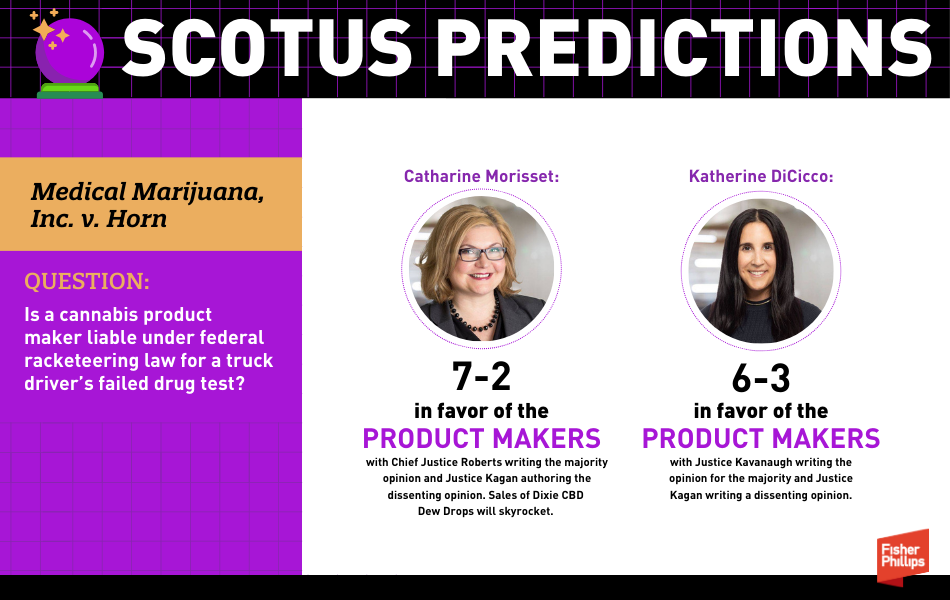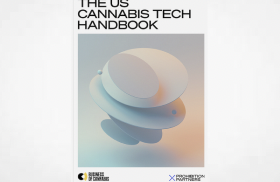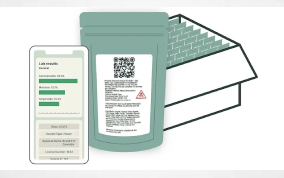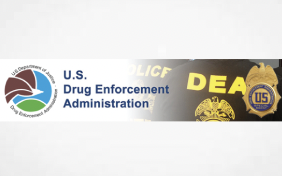A commercial truck driver who lost his job after failing a drug test wants to hold cannabis product makers liable under a federal racketeering law – and the case has worked itself all the way up to the U.S. Supreme Court. The driver claims the product he used was advertised as THC-free, but he says it actually contained the psychoactive component of cannabis. Notably, these claims are generally brought under state law, and we think the Justices will say his federal racketeering claim is a stretch. Businesses in the cannabis industry will want to pay close attention to this case given the liability issues and the potential for steep damages at stake. Employers in general may also be curious about how a SCOTUS ruling in Medical Marijuana, Inc. v. Horn will impact evolving case law on cannabis. Here’s what you need to know about the case and eight questions for employers to consider as you update and fine-tune your workplace policies.
A Quick Breakdown of the Case
The Facts: Horn, a commercial truck driver, was involved in a car accident over 10 years ago that caused injuries to his hip and right shoulder. While seeking alternative natural remedies, he discovered an advertisement for Dixie X CBD Dew Drops Tincture, which claimed to contain 0% THC (the psychoactive component in cannabis) and be compliant with federal law. He was fired after he tested positive for THC during a required periodic drug screen. The driver, however, claimed that he used the tincture for severe pain that was marketed as containing only CBD, which is a non-psychoactive compound found in cannabis, meaning it does not cause a “high.”
The Driver’s Claim: In a novel claim, the driver sued the product makers for false advertising and sought his lost earnings. Among other claims, he asserted fraud under the Racketeer Influenced and Corrupt Organizations Act (RICO). While RICO is typically invoked to target organized crime, it also allows plaintiffs to bring certain civil cases for fraud and potentially collect triple their damages. The 2nd U.S. Circuit Court of Appeals allowed the driver to proceed with his claim, but other appeals courts have tossed similar lawsuits seeking monetary damages under RICO for personal injuries.
The Cannabis Company’s Argument: The product makers want the Supreme Court to dismiss the RICO claim, asserting that the case is merely a “garden-variety products-liability” lawsuit. “Because RICO’s cause of action excludes personal injuries, RICO excludes damages resulting from personal injuries,” the product manufacturers’ attorney said at oral argument on October 15. “It is utterly implausible that Congress federalized every slip and fall involving RICO predicates. Personal injuries are serious and may support state tort claims, but they are not the stuff of RICO.”
SCOTUS Probe: The attorney for the truck driver argued that the loss of income from being fired is plainly “an injury to business or property” that is covered by RICO. Some Justices seemed receptive to this argument. For example, Justice Kagan asked, “If you’re harmed when you lose a job, then you’ve been injured in your business, haven’t you?”
Other Justices seemed more likely to side with the product makers. For example, Justice Kavanaugh said he was concerned that the driver wanted to get around certain limitations by “characterizing the lost wages or medical expenses as separate injuries to your business or property.” He said it would be a “dramatic” shift if every state tort personal injury suit for lost wages or medical expenses could now brought under RICO seeking triple damages.
Likewise, Chief Justice Roberts chimed in to say he “understood the business-or-property limitation as having been intended to be a significant limitation on the reach of RICO.”
FP SCOTUS Prediction: Justices Will Reject the RICO Claim
Based on the questioning at oral argument, we believe that the majority will side with the cannabis product manufacturers and find that RICO does not cover this type of claim. As Justice Kavanaugh said, “that would be a dramatic, really radical shift in how tort suits are brought throughout the United States, and we would expect a clearer indication from Congress” if federal lawmakers had intended to read RICO so broadly.
However, we also anticipate a detailed dissent linking employment losses and business losses. In Justice Kagan’s view, “the simplest, clearest reading of this statutory language is it doesn’t distinguish by what causes the harm.”
Our specific predictions are:
Catharine Morisset: The court will decide 7 to 2 in favor of the product manufacturers, written by Chief Justice Roberts and applying strict construction. Justice Kagan will author the dissenting opinion, joined by Justice Jackson. Sales of Dixie CBD Dew Drops will skyrocket.
Katherine DiCicco: The court will decide 6 to 3 in favor of the product manufacturers, with Justice Kavanaugh writing the opinion for the majority, and Justice Kagan writing a dissenting opinion, with which Justices Sotomayor and Jackson will join. The majority will strictly construe RICO and focus on its primary intended purpose: to eliminate organized crime and racketeering from organizations operating in interstate commerce.
Key Reminders for Employers About Cannabis and the Workplace
Although this case focuses on liability for companies that sell cannabis derived products, we thought we’d take this opportunity to remind all employers about the ways cannabis laws impact the workplace.
First, you should note that state laws vary significantly. Some states allow employers to take adverse action against job applicants or employees solely based on a positive drug test. Some states allow CBD, but not cannabis products containing THC. Others protect registered medical patients in certain situations — and a growing number of states also protect off-duty recreational cannabis use — though many have exceptions for safety-sensitive positions.
Second, you should consider a variety of factors that will shape your drug-testing policies, including your industry, location, job types, and workplace culture. Here are eight key questions you should consider when developing your policies in light of evolving cannabis laws:
- Will you continue pre-employment drug screening and what will you test? Depending on the nature and location of the business and legal prohibitions, employers may opt to drop cannabis from the drug-screening panel. Our recent FP Flash Survey revealed, in fact, that nearly half of employers don’t test applicants for cannabis. However, federal law may still require that cannabis be included on drug screening. But don’t confuse a test for “cannabis” with a test for “THC.” Some states – like California and Washington – allow pre-employment testing only for the psychoactive THC, generally present only in oral fluids. More typical, urine tests may detect cannabis metabolites, which can be present in the body for 30 days or more after use. The U.S. Department of Transportation (DOT) recently finalized rules that allow employers to use oral saliva testing from a certified lab for this reason.
- Will you create a different policy for safety-sensitive positions? Some employers may opt to eliminate THC from pre-employment screening for some roles (such as office jobs) but continue screening for safety-sensitive roles (like forklift drivers and machine workers). Of course, such policies must be applied consistently and comply with applicable state and local requirements.
- How will you handle cases of reasonable suspicion? Even where cannabis use is decriminalized, some states, like Washington and New Jersey, allow or even require employers to prohibit workplace use. Consider developing clear guidelines on how to detect cannabis impairment and what to do when an employee is suspected of working under the influence.
- What will the consequences be for violating company policy on cannabis use and other policies pertaining to having cannabis and cannabis derived products or paraphernalia in the workplace?
- How will you train managers on observing and reporting possible on-the-job use of cannabis?
- Will you have an internal process for employees to dispute the results of an investigation or drug test?
- Do you want to create a single policy that is compliant with all states where you operate or separate policies based on specific state and local rules?
- Have you consulted legal counsel to review your policies or advise on terminations following a positive drug test?
Conclusion
We expect the court to issue an opinion sometime during the next few months. We will continue to monitor developments related to this case and provide an update when SCOTUS issues an opinion.
Source: https://www.jdsupra.com/legalnews/scotus-predictions-cannabis-product-6090115/




















